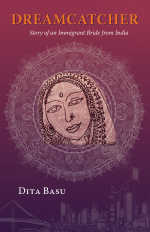Recent Posts
The Giver
The Giver
“The more you accepted, the more you indebted my soul. So my friend, farewell.…” Rabindranath Tagore.
As I stare at the blank journal page this morning, collages of imagery, strings of consciousness appear at random. I’ll try to present it just that way, unadorned, unpolished and figure out later what it was that my soul tries to tell today.
My dear friend Wayne died last night. I met him in a writing class, oh, over ten years ago. Since then we have kept in touch. As I think of him, I feel he left a message for me — a feeling of deep caring, a camaraderie he had for his fellow writer friends.
His face shone with pride when one of us won a contest or were published. He threw surprise parties to celebrate and when we thanked he used to nod with eyes closed and whispered, “You’re welcome,” It was this humble magnanimity that touched my heart. As I look faraway with this thought, an image flashes from memory.
I am in India choosing an Indian outfit to buy for my daughter, fit for a wedding party. In mid-August the weather in Calcutta is torturous. The atmosphere is humid, as if we are cooking inside a steaming covered pot. Sweat trickles from the back of my head down the spine.
The air is heavy. Smoke hisses from the exhaust pipes of ancient double-decker buses. Horns blare from irate cars, impatient, stuck in traffic jams.
A young vendor boy approaches me with a packet of incense sticks in hand. “Please take one. Please. Just ten rupees a packet.”
I brush him off. “No, I don’t need them. I have it.” I say. “Please. Just one. Only ten rupees, Ma.” He pleads, trying to be part of my family, addressing me as ‘Ma’. Ten rupees is equivalent to fifteen cents, yet I say, “I told you, I have it.”
Holding my daughter’s hand, we stepped up to take refuge in an air-conditioned store. A tall man in a three-piece suit and tie opens the heavy door, inviting us.
Inside, it’s nice and cool. Fit for wearing a three-piece suit. Who’d say the outside world is such a madhouse. Serene sitar plays in a low hum. An expensive foreign perfume whiff —the smell of musk mixed with some exotic spices lingers in the air.
“We have just the perfect lehenga for you.” The sales man winks at my daughter, a self-conscious tween. He must have noticed us looking at the dresses that were hanging at the cheap stalls outside. He turns to his assistant, “Bring the special lot,” he says, bending towards him, “NRI”, he hisses. (Non Resident Indians), I overheard it, he doesn’t know.
A young boy brings two ice cold coca-cola bottles for us, “From the house,” he smiles.
The assistant opens an enormous box and unfolds dazzling dresses. A scarlet georgette floor length dress shimmers with antique silver sequences. Then he holds up a milk-white two piece outfit decked with intricate Kashmiri embroidery and a veil like a gossamer scarf with tiny French knots. My daughter is mesmerized, enchanted and confused. I swallow to see the price tags hidden in tiny round pieces of paper hanging with gold silk threads.
“Take both if you are undecided.” The sales guy says, “I’ll give you a good price.” He brushes his stylish French cut beard. “We’ll fix it and make it just for you.” He calls a tailor who appears with a measuring tape hanging from his neck.
“Ready in twenty-four hours.” The old tailor smiles holding the skirt-blouse piece over my daughter’s body guiding her towards the mirror. And I end up buying both, extending my plastic credit card to the salesperson.
“You must need coordinating assessors,” he smiles, shaking his head, crossing his brows, “the jewelry, the shoes, the purse… no?” he asks in a tone , like what a naïve mom. “Mustafa, will take you to our sister store.” He says winking again to his assistant.
As soon as we come out of the air-conditioned store, I am bombarded with the reality of the outside world. The young vendor boy appears again. “Mother, please.Take it. Buy just one. Only ten rupees…Please.” He pleads with hands folded to his chest.
I ignore him and gesture my daughter to board the waiting car, slamming the door in front of his face. The boy backs off.
“Just because you have one,” he glances at my daughter ,” you won’t look at another kid?” He asks.
I turn my head and for the first time really look at his face. The boy, almost as old as my daughter, with sharp features, a head full of messed up overgrown curls resembles the image of Lord Krishna in our prayer room. I notice the beggar boy’s torn shirt, steaks of dirt on the dark cheeks and his beautiful eyes with unusually long lashes.
“Okay, give me one. Just one.” I say and hand him the coin. He drops five packets on my lap through the window and turns.
“Hey, just one I said.” I yell, “At least take your money.” I don’t want to owe a beggar.
“I give you. You give me one, I give you four. I can give too.” He yells back and merges in the crowd. The light turns green. The car speeds up.
The more you accepted the more you indebted my soul, dear friend. *** THE END
This piece was published under my pen name - Dita Basu in California Writers Club The 2021 Annual Literary Review

